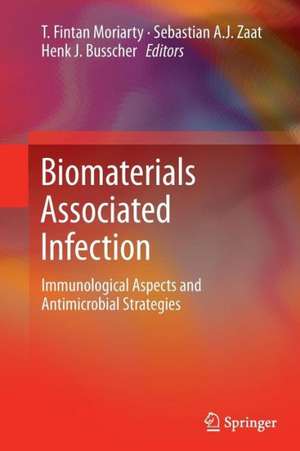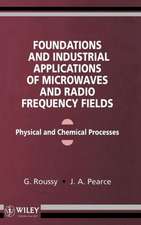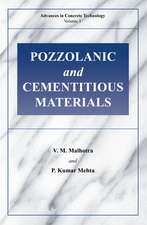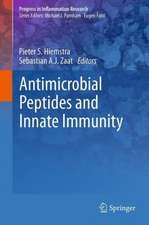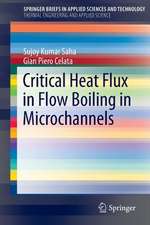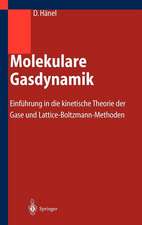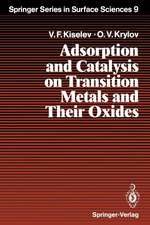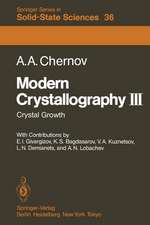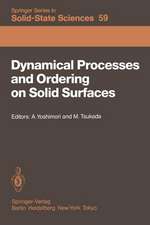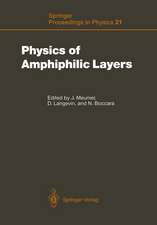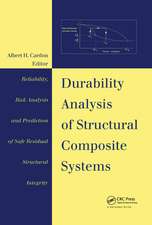Biomaterials Associated Infection: Immunological Aspects and Antimicrobial Strategies
Editat de Fintan Moriarty, Sebastian A. J. Zaat, Henk J. Busscheren Limba Engleză Paperback – 14 oct 2014
| Toate formatele și edițiile | Preț | Express |
|---|---|---|
| Paperback (1) | 957.94 lei 6-8 săpt. | |
| Springer – 14 oct 2014 | 957.94 lei 6-8 săpt. | |
| Hardback (1) | 963.15 lei 6-8 săpt. | |
| Springer – 28 sep 2012 | 963.15 lei 6-8 săpt. |
Preț: 957.94 lei
Preț vechi: 1168.21 lei
-18% Nou
Puncte Express: 1437
Preț estimativ în valută:
183.32€ • 199.06$ • 153.99£
183.32€ • 199.06$ • 153.99£
Carte tipărită la comandă
Livrare economică 22 aprilie-06 mai
Preluare comenzi: 021 569.72.76
Specificații
ISBN-13: 9781489993748
ISBN-10: 1489993746
Pagini: 580
Ilustrații: XIV, 566 p.
Dimensiuni: 155 x 235 x 30 mm
Greutate: 0.8 kg
Ediția:2013
Editura: Springer
Colecția Springer
Locul publicării:New York, NY, United States
ISBN-10: 1489993746
Pagini: 580
Ilustrații: XIV, 566 p.
Dimensiuni: 155 x 235 x 30 mm
Greutate: 0.8 kg
Ediția:2013
Editura: Springer
Colecția Springer
Locul publicării:New York, NY, United States
Public țintă
ResearchCuprins
Preface
PART 1. The Pathogenesis of Medical Device associated Infection
Chapter 1: Biomaterial associated infection: a perspective from the clinic
Chapter 2: Staphylococcus epidermidis in biomaterial associated infection
Chapter 3: Staphylococcal virulence factors
Chapter 4: Propionibacterium acnes: a new emerging pathogen in biomaterial associated infection
Chapter 5: Bridging the gap between in vitro and in vivo testing for Biomaterial associated infection
Chapter 6: Biomaterial-dependent characteristics of the foreign body response and S. epidermidis biofilm interactions
Chapter 7: Dendritic cell-biomaterial interactions: implications for the onset and development of the foreign body response
Chapter 8: Tissue Colonisation in Biomaterial-Associated Infection
Chapter 9: Treatment options for medical device associated infection
Chapter 10: Novel antimicrobial strategies: honey and antimicrobial peptides
Chapter 11: Infections associated with implanted dental devices
Chapter 12: Animal models of orthopedic implant related infection
PART 2: Biomaterial-based Strategies to Reduce Medical Device Associated Infection
Chapter 13: Antimicrobial medical devices in preclinical development and clinical use
Chapter 14: Silver containing biomaterials
Chapter 15: Quaternary ammonium Compounds
Chapter 16: Anti-adhesive and Antibacterial Polymer Brushes
PART 3: Clinical applications, case studies
Chapter 17: Orthopaedic device design and antibiotic coatings reduce infection rates
Chapter 18: The indwelling bladder catheter: attempts to prevent infection and the development of bacterial biofilms
Chapter 19: Antimicrobial-Modified Vascular Catheters
Chapter 20: Topical Antimicrobial Containing Biomaterials for Peri-Implant Infections in the Oral Cavity
Chapter 21: Preventive Strategies in VAP: Focus on Silver-Coated Endotracheal Tubes
Index
PART 3: Clinical applications, case studies
Chapter 17: Orthopaedic device design and antibiotic coatings reduce infection rates
Chapter 18: The indwelling bladder catheter: attempts to prevent infection and the development of bacterial biofilms
Chapter 19: Antimicrobial-Modified Vascular Catheters
Chapter 20: Topical Antimicrobial Containing Biomaterials for Peri-Implant Infections in the Oral Cavity
Chapter 21: Preventive Strategies in VAP: Focus on Silver-Coated Endotracheal Tubes
Index
PART 1. The Pathogenesis of Medical Device associated Infection
Chapter 1: Biomaterial associated infection: a perspective from the clinic
Chapter 2: Staphylococcus epidermidis in biomaterial associated infection
Chapter 3: Staphylococcal virulence factors
Chapter 4: Propionibacterium acnes: a new emerging pathogen in biomaterial associated infection
Chapter 5: Bridging the gap between in vitro and in vivo testing for Biomaterial associated infection
Chapter 6: Biomaterial-dependent characteristics of the foreign body response and S. epidermidis biofilm interactions
Chapter 7: Dendritic cell-biomaterial interactions: implications for the onset and development of the foreign body response
Chapter 8: Tissue Colonisation in Biomaterial-Associated Infection
Chapter 9: Treatment options for medical device associated infection
Chapter 10: Novel antimicrobial strategies: honey and antimicrobial peptides
Chapter 11: Infections associated with implanted dental devices
Chapter 12: Animal models of orthopedic implant related infection
PART 2: Biomaterial-based Strategies to Reduce Medical Device Associated Infection
Chapter 13: Antimicrobial medical devices in preclinical development and clinical use
Chapter 14: Silver containing biomaterials
Chapter 15: Quaternary ammonium Compounds
Chapter 16: Anti-adhesive and Antibacterial Polymer Brushes
PART 3: Clinical applications, case studies
Chapter 17: Orthopaedic device design and antibiotic coatings reduce infection rates
Chapter 18: The indwelling bladder catheter: attempts to prevent infection and the development of bacterial biofilms
Chapter 19: Antimicrobial-Modified Vascular Catheters
Chapter 20: Topical Antimicrobial Containing Biomaterials for Peri-Implant Infections in the Oral Cavity
Chapter 21: Preventive Strategies in VAP: Focus on Silver-Coated Endotracheal Tubes
Index
PART 3: Clinical applications, case studies
Chapter 17: Orthopaedic device design and antibiotic coatings reduce infection rates
Chapter 18: The indwelling bladder catheter: attempts to prevent infection and the development of bacterial biofilms
Chapter 19: Antimicrobial-Modified Vascular Catheters
Chapter 20: Topical Antimicrobial Containing Biomaterials for Peri-Implant Infections in the Oral Cavity
Chapter 21: Preventive Strategies in VAP: Focus on Silver-Coated Endotracheal Tubes
Index
Textul de pe ultima copertă
Biomaterials associated infection (BAI) is one of the most common complications associated with implantation of any biomaterial regardless of form or function. These infections usually involve bacterial colonization and biofilm formation on the biomaterial itself, rendering the infection impervious to antimicrobials and host defenses. In addition, it is becoming increasingly clear that infection of the surrounding tissues also plays an important role in BAI, and that the infection may be influenced by the composition and design of the implanted biomaterial. In this book, worldwide leaders in the field address this critical problem in the translation of biomaterials research into clinical practice. The book begins with an emphasis on the latest research in the pathogenesis of BAI from microbiological, immunological, and materials science perspectives. The current state of the art in antimicrobial activation of biomaterials through surface modification and the incorporation of antimicrobial agents is then discussed. In the concluding chapters, successful translation of a selection of antimicrobial technologies from preclinical research into clinical use is described alongside a discussion of the utility of these devices and perspectives for future development. This book is essential reading for researchers and clinicians who are interested in understanding the fundamentals of BAI, the latest in antimicrobial materials research, and the state of the art in clinically available antimicrobial containing medical devices.
Provides a clinical perspective to set research directions
Summarizes the pathogenicity of the most common bacterial species isolated in BAI
Covers both biofilms and tissue reservoirs as modes of infection
Presents state-of-the-art issues of immune function in the vicinity of implanted biomaterials
Describes the latest technologies for antimicrobial activation of biomaterials
Provides a clinical perspective to set research directions
Summarizes the pathogenicity of the most common bacterial species isolated in BAI
Covers both biofilms and tissue reservoirs as modes of infection
Presents state-of-the-art issues of immune function in the vicinity of implanted biomaterials
Describes the latest technologies for antimicrobial activation of biomaterials
Caracteristici
Provides a clinical perspective to set research directions
Summarizes the pathogenicity of the most common bacterial species isolated in BAI
Covers both biofilms and tissue reservoirs as modes of infection
Presents state-of-the-art issues of immune function in the vicinity of implanted biomaterials
Describes the latest technologies for antimicrobial activation of biomaterials
Includes supplementary material: sn.pub/extras
Summarizes the pathogenicity of the most common bacterial species isolated in BAI
Covers both biofilms and tissue reservoirs as modes of infection
Presents state-of-the-art issues of immune function in the vicinity of implanted biomaterials
Describes the latest technologies for antimicrobial activation of biomaterials
Includes supplementary material: sn.pub/extras
